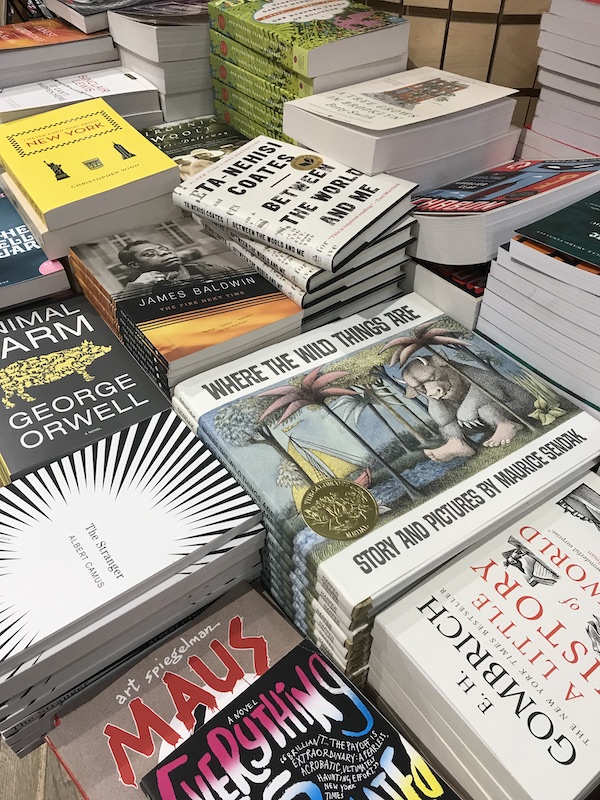According to Amazon therapist Bea Arthur, “financial anxiety is the biggest crisis in America” right now. And while it’s true that money itself undergirds many of today’s most divisive political issues (health care, campaign finance, and the like), the experience of financial anxiety in daily life is real and pronounced.
For example, according to a 2018 survey by Northwestern Mutual, money is the number one source of stress for 44% percent of Americans, who claim it causes them more anxiety than work (18%) and personal relationships (25%).
Money is so wrapped up in identity and how we value ourselves that it’s hard to disentangle where financial status ends and true well-being begins. Sure, wealthy people tend to be healthy people, because it is expensive to eat well, join a gym, use all-natural cleaning and personal care products, and shy away from plastic consumer goods.
As a culture, our mere perspective on money also shapes our feelings of self-worth and wellbeing. For example, when people feel that their own good impressions of themselves are at risk– like when they’ve suffered an embarrassment or slight– they may try to increase their savings, according to research from the American Psychological Association. This compensatory anxiety perpetuates a bedrock assumption that exists in America today, which is that money = wellbeing.
^ This may or may not be true, but it’s an especially prescient observation in a society where social welfare programs are increasingly threatened, in a decade where wealth inequality has increased more than in any other previous decade in American history.
Alas, our growing awareness of this inequality and fringe policy proposals like Universal Basic Income are gaining traction. In the meantime, these money-saving hacks can help you lower your cost of living well in the digital age.
***
Install the Honey Extension + Rakuten on Your Web Browser
Never pay full price for anything on the Internet– or at least try not to. Installing a coupon finder on your browser is one of the easiest money-saving hacks for shopping online. Honey and Rakuten are the most popular coupon browser extensions in America at the moment.
Honey’s “Drop List” function on Amazon is also great. It allows you to set alerts for products you are interested in buying so that you can get a notification if and when the price goes down.
Prioritize Your Most Frequent Purchases
Make a list of go-to essentials that you regularly buy. Then, google manufacturers coupons for those things, and join the email list for those products to get notifications whenever they go on sale.
Often, companies offer a discount for signing up for their newsletter, like 20% your next purchase.
At the grocery store, ask for box or bulk discounts on high-use items (anything that you’re likely to buy more than 12 of at a time, like protein bars or mangoes).

Sell Back Old Clothes and Books
If you live in a city with any vintage shops or used book stores, check to see if they do used clothing or book buy-back. Vintage shops like Buffalo Exchange and Beacon’s Closet in New York City buy used clothes in good condition, which they clean and resell at their vintage consignment shops.
You might only get a few dollars, but they will pay you for anything used that they can re-use. And it keeps more clothing out of the landfill!
Book stores like The Strand in New York City also do book buy-back. They also donate the books that they can’t buy, so at least when you’re getting rid of stuff it goes to a good cause.
Online, eBay and the Facebook buy and sell groups are also great choices for selling both clothing and books– two popular genres of resale items.
Take Advantage of The Library
Public libraries across America are consistently under-utilized and under-valued. Instead of buying that book you really want to read, get it from the library. Got lots of stuff to print? Use the library.
Need a free place to entertain your children? Send them to the kids section in the library while you do work nearby. You get the idea.
Use the GoodRx App
The GoodRx App is a free app that subsidizes the cost of prescription drugs at the Pharmacy. It acts as a “replacement” for health insurance during the transaction with the pharmacy, and it often makes it cheaper to buy generic drugs if your doctor can write you a prescription for them.
For example, a bottle of (30) 10mg Zyrtec at CVS typically costs about $24– almost 1 dollar per pill. With a prescription from your doctor and using the GoodRx app at the pharmacy, you can get 30 cetirizine pills (the generic form of Zyrtec) for ~$1. Literally!
While price is a steal for generic drugs, you’ll just want to make sure you don’t have any allergies or sensitivities to generic alternatives to the medicines you’re currently taking.
Fortunately, the GoodRx app works to keep people safe by ensuring that it cannot be used without a doctor’s note. (The script ensures that your doctor knows and approves of this swap.)
Still, it pays to remember that although generic drugs do have the same active ingredients as name-brand medicines, they may also have different fillers. As far as money-saving hacks go, however, using GoodRx ranks among the best.

Work Out Outside or At Home Rather Than Going to the Gym
It’s no secret that most people don’t get the value out of their gym membership. Additionally, there is no evidence to suggest that having a gym membership increases your likelihood of going to the gym.
However, at-home videos or working out with a friend tend to inspire higher success rates. If this is the case, it helps that watching workout videos on YouTube or going for a run outside is also free.
Make use of the “gym” that you already have access to, and save the cost of an unused membership.
Membership Discounts
Look for AAA discounts on train tickets, entertainment, dining, etc. Remember that you can book cheap rental cars through Costco if you have a membership.
Use credit card points efficiently to pay for future expenses. Also, consider joining loyalty rewards programs at the places where you are a regular customer.
The one exception to this rule is with respect to airline miles rewards programs. Generally speaking, airline loyalty programs don’t save people money. This is because airline miles devalue over time.
Also, the rules for how to apply them are always changing at the whim of mergers and other business consolidation. It can’t hurt to stack up the points if signing up for the loyalty program is free. However, you should never pay money to buy miles.
Be Wary of Lapsed Subscriptions
Periodically you should do an audit of your credit card statement and make sure you are using every subscription service that goes on auto-pay. Many think pieces about money-saving hacks have been penning on this topic alone. Do you subscribe to Netflix, Hulu, HBO, and Amazon Prime? If so, are you using all of those services equally?
If you can eliminate any of these redundancies, you’ll save the annual cost, which can add up quickly. Newspaper subscriptions, Cost Co memberships, Adobe software subscriptions, and aspirational gym memberships fall into this category, as well.
Barter Your Skills
I have a friend who cuts my other lawyer friend’s hair for free. In exchange, the lawyer gives her help with writing business contracts. If you have a skill that could help you save money among close friends, use it! Start-up photographers often trade images (e.g. their skills) for goods, exposure, or access to events.
While there’s a negative stigma surrounding working for “exposure” instead of money, this can be helpful depending on your specific goals.
In the Internet age, it’s also easier than ever to connect with someone who might have a skill that they’d be willing to trade. Think outside the box.
Take Advantage of Cyber Monday/Black Friday
If you are considering making a large purchase anytime after Labor Day, consider delaying that purchase until Black Friday or Cyber Monday, when many cost-saving deals go live. If it’s not a time-sensitive purchase, the potential savings will be worth the wait.
Also, the fact that you’ve identified this “watch item” early will spare you from impulse buying something that you don’t need just because it was on sale.
Travel lovers should also remember that airlines usually have Cyber Monday deals, as well.
Don’t Be Afraid to Ask for Discounts That Aren’t Obvious
Wedding-related expenses, lawyer fees, and health care costs might not seem like expenses about which you can “haggle,” but oftentimes, you can. Always ask for a discount. The worst that can happen is that the person will say no. Here are three examples from my own personal life.
- I once received a medical bill from a lab that was higher than I expected. My husband suggested I call and ask for “a discount” (he’s much more confident at negotiating than I am). At first, I was mortified at the prospect and also shocked: I didn’t think any medical expenses were negotiable after the insurance company rendered their verdict. “Everything is negotiable,” my husband said, so I did it. He encouraged me to say, “This bill is higher than I planned for. Is there any way you can give me a discount?” Sure enough, the medical offices said yes, and they cut $150 off the bill! Ever since this moment I’ve been an evangelist. The worst that can happen when you ask for a discount is that the person will say no. And if asking makes you feel weird because of your pride, then, well, that’s a separate issue.
- At a museum in Copenhagen when I was in college, I randomly asked if there was a student discount. There were no signs indicating that this was something they did, but I knew that student discounts are common practice at museums. The person at the desk said yes. This saved me and my friend a combined $18 on entry fees.
- Later, as a working adult in Italy, I asked if there was a media discount before entering an art museum. They said yes, I showed them my press credentials, and saved $11. And I know what you’re thinking: not everyone is media. That may be true, but my backup plan was to ask if they offered an AAA discount. One of the two was bound to work. (Senior discounts also fall into this category.)
Get Creative With Your Coupons
Periodically, my mom will use her saved CVS coupons to buy pistachios from the snack section. Pistachios are a high volume use good in her household. This is a brilliant application of coupons that people usually use to buy things they don’t need.
Again, this is why it’s helpful to have a go-to list of priority goods. Whenever you have a coupon for a store that sells a little bit of everything, you already have a list of things you could buy with it. This way, you won’t be lured into money-draining impulse buys for the sake of saving money just because you can.
Argue When Necessary
If the product is bad, or there is a mistake on your bill: swallow your pride and argue it. If your flight was terrible, call them and complain! I’m not saying to do this with the intent of getting your money back, but that’s often what will happen. You work hard for your money. Don’t let other people’s mistakes be the reason you spend more of it than necessary.
Note Which of Your Charitable Donations Are Tax-Deductible
Do not forget to take your tax deductions! If you donate money to a cause, it’s worth keeping the receipt. A lot of people forget to do this and miss out on a potential tax benefit.
Shop Overstock Stores for Great Deals
Lot Less, Ocean State Job Lot, BJ’s and other overstock stores can be real money savers. This is especially so if you’re shopping for a family that goes through a lot of the same products regularly.
Overstock stores regularly sell organic products and surplus mainstream brands like Kleenex, Tide, Revlon, and Pyrex. Just be wary of impulse buys, which many people make when they experience the thrill of a good deal.

Hack The Farmers Market
Go in the last hour to most farmers market across the country and you’ll usually get a discount. Most growers who were selling broccolini for $5/lb at Noon will be selling it for $2/lb at 5 PM, as they need to get rid of their produce before they pack up. Usually, when it’s the end of the day, farmers will just sell it for cheap to get rid of it.
You can also totally haggle produce (not so much for meat/dairy, which has a longer shelf life). This is something I did not know before moving to New York, and then one day at the Union Square Farmers Market, I saw someone do it! And my mind was blown.
Heirloom Cherry Tomatoes were selling for $6 a pint, and the person asked, “Could you give me 2 for $10?” That made sense financially for both parties as the vendor didn’t want to have to make change. And this person saved $2.
That’s not much, but when you do this consistently and regularly, it adds up. I also want to note that it’s not my intention to bankrupt farmers, who are doing heroic work. But if you really need to reduce the cost of your lifestyle but don’t want to compromise on health, it can never hurt to ask.
Also– buy the ugly produce. Ask, “Is there an ugly produce discount?” if something has a hole in it or a cosmetically imperfect blemish that you could just cut off. Farmers will usually sell that fruit or vegetable for cheap.
Harvard Offers Free Online Courses If You’re Looking To Learn a New Skill But Don’t Want to Pay For It
This is hardly a daily expense, but Harvard offers free online courses in various subjects that people often pay money to learn about, like computer programming.
Led by industry thought leaders, the classes are self-paced, so you can take them on your own schedule. Classes can also be accessed from any computer for a number of weeks after enrollment, until the free subscription expires.
You also don’t have to take the class for credit. Coursera, for example, allows class audits in which viewers just learn the skill and start applying it to their lives. You won’t get a certificate proving you took the course, but you can gain the same knowledge. People pay a lot of money for a good education. Take advantage when it is free.
***
Related: Read our article on What To Do If You Can’t Afford Therapy.




[…] Worried about money more broadly? Consult this checklist of 17 Money Saving Hacks for When You Can’t Stop Worrying About Money. […]